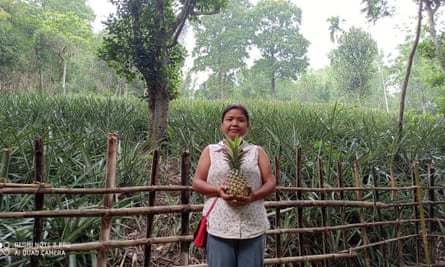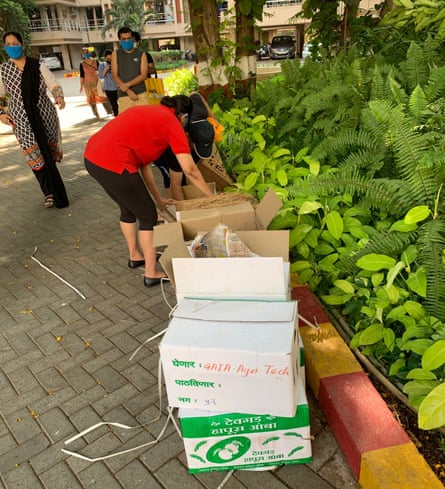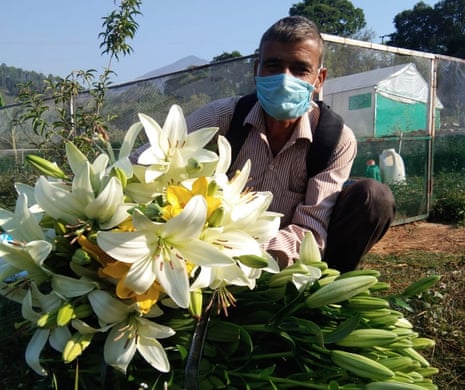When the call finally comes, the connection is so poor that Silme Marak can barely catch the words. After running upstairs to the roof of her house for a better signal, the 39-year-old farmer finally hears the first piece of good news to come her way in months: an order for 600 pineapples from a harvest that she had feared might have to be left to rot.
Marak lives in the Tura town of Meghalaya, a hilly place in north-east India whose name translates as “the abode of clouds”. She is among millions of farmers in India – agriculture contributes nearly a seventh of the country’s GDP – in despair at the prospect of seeing their produce rot as the country entered a severe lockdown in the third week of March. According to a Credit Suisse report, vegetable farmers alone have lost upwards of Rs 20,000 crore (£2.5bn).

Now technology has come to the rescue of some of those farmers, as befits a country that boasts a large population of tech-savvy entrepreneurs.
“The local wholesalers were offering such low rates, and the produce was rotting. That was when I got a call from A-Bani suggesting I market my produce online,” says Marak.
A-Bani is an app launched a few weeks ago by the nonprofit Anant Foundation to connect Meghalaya farmers with buyers interested in high-quality organic produce, such as turmeric, pineapple, jackfruit, and cashew.
“I realised I would be making 70% more per kilo,” says Marak. Adding pride to profit, it is the first time her produce will be sold outside Meghalaya – no mean feat for a farmer in a frontier state. It helps that several states have relaxed rules allowing farmers to sell directly to consumers anywhere in the country.
The app is just one of dozens of virtual markets that have opened up during the lockdown as quickly as the street markets shut down. Many of them were community farming initiatives that are now using the internet to connect farmers with consumers.
Dhanunjaya KC discovered one of those when the lockdown sent him back from his engineering college in Bengaluru to his family’s two-hectare grape orchard in Gudahalli. A Google search for “How to sell agricultural produce online in India” led him to the Twitter account Harvesting Farmer Network (HFN).
“Ruchit Garg, who runs it, posted my details on Twitter. My phone hasn’t stopped ringing since then,” says Dhanunjaya. He and his father rented a truck to go to Bengaluru and deliver boxes of grapes to 30 apartment complexes. They made Rs 25 per kg. The middlemen in Gudahalli were offering Rs 8-10 per kilo.
HFN is a virtual network connecting farmers directly with customers across the country that Garg runs from his home in Chandigarh, north India. The founder of an agritech company, Garg stepped in when he saw pictures of farmers feeding their broccoli harvest to cows because there were no buyers. He has now launched a website to take HFN beyond Twitter.
“In two months, we’ve sold 20,000 tonnes of produce – avocados from Nilgiris to papaya from Chattisgarh,” says Garg, whose team helps farmers with packaging and delivery.
Up in Tons Valley, in the hill state of Uttarakhand, social entrepreneur Anand Sankar has made a success out of pre-ordering and pre-payment for the apple orchards that dot the landscape. Sankar ran a social media campaign to sell 250 boxes of apples to individuals in Coimbatore, Delhi, Chennai and Bengaluru.

Mango farmers along the Konkan coast in Maharashtra, devastated by the pause on exports, are now receiving a flood of orders from housing societies in Pune and Mumbai facilitated by startup Gaia Agritech.
The idea of buying fresh produce directly from the grower, often at a competitive rate, appeals to city dwellers. Anamika Bist, who lives in a Bengaluru high rise and runs Village Story, a community farming enterprise, organised an online Lockdown Farmers’ Market, circulating farmers’ details across social media. Her WhatsApp has not stopped buzzing in the last two months.
More than 1,400 miles away, in the Himalayan town of Pithoragarh, Hemendra Negi, a 31-year-old flower grower, chanced upon Bist’s social media campaign. Within days of contacting her, he had more than 400 enquiries, and an order of 30,000 flowers to deliver in May, at three times the rate of the local wholesale market.
Negi pleaded with truck drivers transporting vegetables to carry his boxes of flowers to relatives in Delhi who then hand delivered them across the city.
The new digital platforms are now gearing up for a longer shelf life. Leather exporter Sunil Gahtori, who has linked a network of 30 farmers with 200 housing societies around Bengaluru through the initiative Taru (Team for Agri Resource Utilisation) and is building an app for it, says it should encourage a deep think into healthy, organic living.
The food policy analyst Devinder Sharma says macro level policies are needed to manage volume and sustain agriculture during the pandemic. “Just like people have a family doctor, they should have a family farmer, too,” he says.
